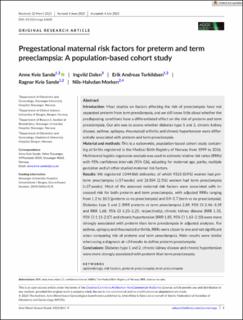| dc.contributor.author | Sande, Anne Kvie | |
| dc.contributor.author | Dalen, Ingvild | |
| dc.contributor.author | Torkildsen, Erik Andreas | |
| dc.contributor.author | Sande, Ragnar | |
| dc.contributor.author | Morken, Nils-Halvdan | |
| dc.date.accessioned | 2023-11-21T13:40:14Z | |
| dc.date.available | 2023-11-21T13:40:14Z | |
| dc.date.created | 2023-09-25T19:49:34Z | |
| dc.date.issued | 2023-07 | |
| dc.identifier.citation | Sande, A.K., Dalen, I., Torkildsen, E.A., Sande, R. & Morken, N-H. (2023) Pregestational maternal risk factors for preterm and term preeclampsia: A population-based cohort study. Acta Obstetricia et Gynecologica Scandinavica, 102(11), 1549-1557 | en_US |
| dc.identifier.issn | 0001-6349 | |
| dc.identifier.uri | https://hdl.handle.net/11250/3103876 | |
| dc.description.abstract | Introduction
Most studies on factors affecting the risk of preeclampsia have not separated preterm from term preeclampsia, and we still know little about whether the predisposing conditions have a differentiated effect on the risk of preterm and term preeclampsia. Our aim was to assess whether diabetes type 1 and 2, chronic kidney disease, asthma, epilepsy, rheumatoid arthritis and chronic hypertension were differentially associated with preterm and term preeclampsia.
Material and methods
This is a nationwide, population-based cohort study containing all births registered in the Medical Birth Registry of Norway from 1999 to 2016. Multinomial logistic regression analysis was used to estimate relative risk ratios (RRRs) with 95% confidence intervals (95% CIs), adjusting for maternal age, parity, multiple gestation and all other studied maternal risk factors.
Results
We registered 1 044 860 deliveries, of which 9533 (0.9%) women had preterm preeclampsia (<37 weeks) and 26 504 (2.5%) women had term preeclampsia (>37 weeks). Most of the assessed maternal risk factors were associated with increased risk for both preterm and term preeclampsia, with adjusted RRRs ranging from 1.2 to 10.5 (preterm vs no preeclampsia) and 0.9–5.7 (term vs no preeclampsia). Diabetes type 1 and 2 (RRR preterm vs term preeclampsia 2.89, 95% CI 2.46–3.39 and RRR 1.68, 95% CI 1.25–2.25, respectively), chronic kidney disease (RRR 1.55, 95% CI 1.11–2.17) and chronic hypertension (RRR 1.85, 95% CI 1.63–2.10) were more strongly associated with preterm than term preeclampsia in adjusted analyses. For asthma, epilepsy and rheumatoid arthritis, RRRs were closer to one and not significant when comparing risk of preterm and term preeclampsia. Main results were similar when using a diagnosis at <34 weeks to define preterm preeclampsia.
Conclusions
Diabetes type 1 and 2, chronic kidney disease and chronic hypertension were more strongly associated with preterm than term preeclampsia. | en_US |
| dc.language.iso | eng | en_US |
| dc.publisher | John Wiley & Sons Ltd on behalf of Nordic Federation of Societies of Obstetrics and Gynecology (NFOG) | en_US |
| dc.rights | Attribution-NonCommercial-NoDerivatives 4.0 Internasjonal | * |
| dc.rights.uri | http://creativecommons.org/licenses/by-nc-nd/4.0/deed.no | * |
| dc.subject | svangerskapskomplikasjoner | en_US |
| dc.subject | premature fødsler | en_US |
| dc.title | Pregestational maternal risk factors for preterm and term preeclampsia: A population-based cohort study | en_US |
| dc.type | Peer reviewed | en_US |
| dc.type | Journal article | en_US |
| dc.description.version | publishedVersion | en_US |
| dc.rights.holder | © 2023 The Author(s). | en_US |
| dc.subject.nsi | VDP::Medisinske Fag: 700::Klinisk medisinske fag: 750::Gynekologi og obstetrikk: 756 | en_US |
| dc.source.pagenumber | 1549-1557 | en_US |
| dc.source.volume | 102 | en_US |
| dc.source.journal | Acta Obstetricia et Gynecologica Scandinavica | en_US |
| dc.source.issue | 11 | en_US |
| dc.identifier.doi | 10.1111/aogs.14642 | |
| dc.identifier.cristin | 2178752 | |
| cristin.ispublished | true | |
| cristin.fulltext | original | |
| cristin.qualitycode | 1 | |

